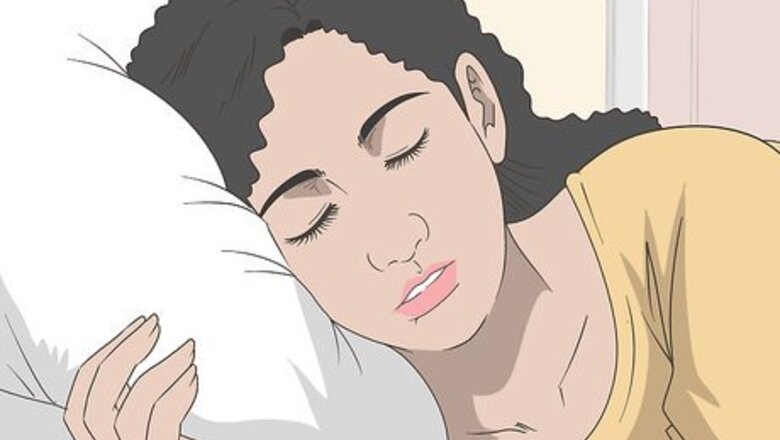
views
Combatting Common Side Effects
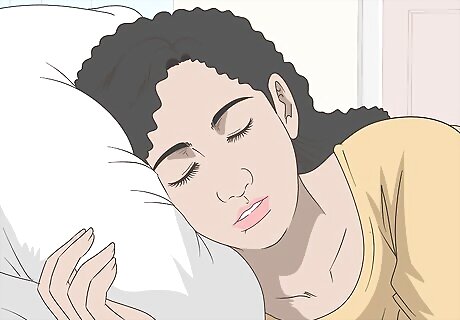
Adopt good sleep hygiene to deal with insomnia. Insomnia is a common side effect of Wellbutrin. If you have difficulty falling asleep or staying asleep, avoid caffeine in the afternoon and evening and develop a bedtime ritual for yourself, such as taking a bubble bath, putting on pajamas, and reading a chapter in a book. This may help you to wind down and relax at the end of the day. About 10-40% of people who take Wellbutrin experience insomnia, so it's very common. Tip: Most side effects of Wellbutrin will go away within 1 to 2 weeks. Do what you can to cope with the side effects during this adjustment period. However, if the side effects continue or are too bothersome to wait them out, talk with your doctor about switching to a different medication.
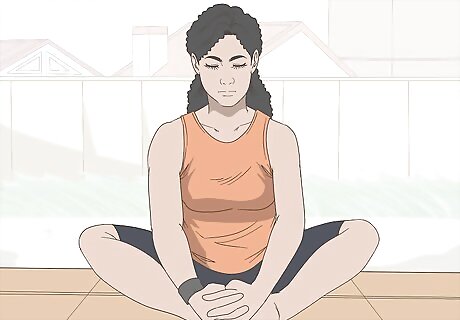
Relax for 30 minutes every day to ease your anxiety. If you experience anxiety while taking Wellbutrin, choose something you find relaxing to help ease it. Set aside a specific time to relax every day, such as after work, school, or dinner. Some relaxing activities you might try include: Going for a walk in nature. Taking a long bath or shower. Doing a relaxation exercise, such as deep breathing or progressive muscle relaxation. Practicing yoga or meditation.Warning: Because Wellbutrin can cause anxiety, it might not be right for you if you already have anxiety. Talk to your doctor to discuss your anxiety and your treatment options.

Drink water throughout the day to hydrate a dry mouth. You might experience dry mouth while taking Wellbutrin, which you can remedy easily by taking frequent sips of water. Keep a water bottle with you at all times so that you can take a sip whenever you need to. About 10-30% of people who take Wellbutrin experience dry mouth. This may also be helpful if you’re experiencing a sore throat. Drink warm liquids, such as herbal tea, warm water with honey, and broth, for a soothing way to combat this symptom while also staying hydrated.
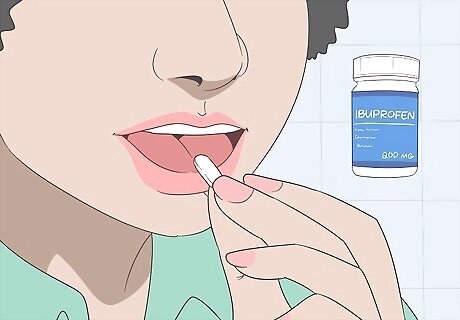
Take ibuprofen or acetaminophen if you get a headache. You may notice that you get more frequent headaches while taking Wellbutrin. If you get a headache, take a dose of an over-the-counter pain medication, such as acetaminophen or ibuprofen. These are usually effective at controlling mild to moderate pain, so the headache should go away about 30 to 60 minutes after taking the medication. If over-the-counter medications don’t help, call your doctor to find out if you should take something stronger. They might recommend a different over-the-counter medication or prescribe something if your headaches are severe. Avoid pain relievers that contain caffeine, such as Excedrin and Midol. These can exacerbate other side effects of Wellbutrin, such as insomnia and anxiety.
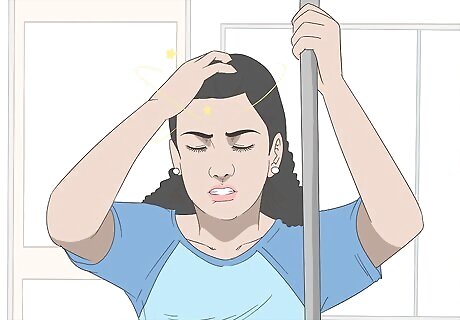
Hold onto something or sit down if you get dizzy. Dizziness is another common side effect of Wellbutrin. If you get dizzy, hold onto a wall, a sturdy piece of furniture, or ask a friend to let you hold onto their arm for support. You may also want to sit down for a few minutes until the dizziness passes.

Schedule sex for times when sexual side effects are less noticeable. Sexual side effects are not as common with Wellbutrin as they are with other antidepressants, but some people do experience them. These may include loss of libido, delayed orgasm, or the inability to get an erection (in men). If you’ve noticed any of these side effects, pay attention to when they are least apparent and try to time sex for these times. For example, you might notice that the sexual side effects of your medication are less noticeable in the afternoon than in the evening. If so, this might be a better time to plan on having sex, if possible. You can also talk with your doctor about lowering your dose of Wellbutrin or trying a medication meant to help with sexual dysfunction if sexual side effects are becoming bothersome.
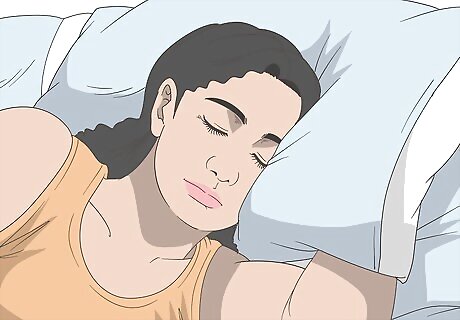
Sleep for 7 to 9 hours every night if you have drowsiness. While drowsiness isn't common with Wellbutrin, it does sometimes occur as a side effect. If you're feeling drowsy, it’s especially important for you to get enough sleep while taking this medication. By sleeping for 7 to 9 hours every night, you may notice the drowsiness less or not at all. Try to go to bed at the same time every night and wake up at the same time every day so you are in a good routine. For example, you might go to bed at 9:00 pm and wake up at 6:00 am to ensure that you get 7 to 9 hours of sleep.
Dealing with Gastrointestinal and Urinary Side Effects

Take your medication with food to help prevent nausea. Taking Wellbutrin with a meal or snack may help to prevent nausea, which is a common side effect of Wellbutrin. Even if you only have time to have something small, such as few crackers and a glass of milk, this may help to prevent nausea.

Drink ginger tea for nausea and vomiting. Ginger is an effective natural remedy again nausea and vomiting. If you feel nauseous in the first 1 to 2 weeks of taking Wellbutrin, keep in mind that this is normal and usually temporary as your body adjusts to the medication. Try sipping on a cup of ginger tea to help with this side effect. You can purchase ginger tea in a grocery store or make a cup using fresh ginger. Peel and chop a 1 in (2.5 cm) piece of fresh ginger. Then, bring 8 fl oz (240 mL) of water to a boil and pour it over the ginger. Let the tea steep for 10 minutes, then sip it slowly. If you don’t have time to make a cup of tea, chew on a 1 in (2.5 cm) piece of fresh, peeled ginger. If ginger doesn’t help, you could also try taking an over-the-counter medication for nausea and vomiting.

Eat healthy, high-fiber foods if you're constipated. Constipation is a common side effect of Wellbutrin. However, you may be able to combat this side effect by adjusting your diet. Include more fruits, veggies, and whole grains in your diet to promote regular bowel movements. Try to get 14 grams of fiber for every 1,000 calories you eat. For example, if you eat, 2,000 calories per day, aim for 28 grams of fiber per day. Make sure to increase the amount of fiber in your diet slowly. Increasing your fiber intake rapidly can lead to more gastrointestinal issues, such as bloating and gas. Tip: You might also consider taking a psyllium husk fiber supplement. These are widely available in grocery stores and you can mix them in with water or juice for an easy way to get more fiber.

Choose foods that you enjoy if you’re experiencing loss of appetite. It’s common for some people to feel less hungry while they’re taking Wellbutrin. If you notice this side effect, try focusing on eating foods you enjoy for the first 1 to 2 weeks to ensure that you’re getting enough calories. As your body adapts to the medication, your appetite should return to normal, but let your doctor know if it doesn’t. Also, tell your doctor if you have lost weight since starting Wellbutrin. This is a common side effect, but it may be an issue if you become underweight. Some people also notice changes in their sense of taste, so foods you used to enjoy might not appeal to you.

Cut back on caffeine and alcohol if you’re urinating more often. Having the urge to go to the bathroom more often may be from taking Wellbutrin. However, this can also be caused by other medical conditions, so it’s important to tell your doctor if you are urinating more frequently. To deal with this side effect, cut back on the amount of caffeine and alcohol you consume, since these are diuretics and they make you have to urinate more often. It’s also a good idea to limit the amount of fluid that you drink in the evening. Try to stop drinking fluids about 1 hour before bedtime to avoid having to get up in the middle of the night to urinate.
Seeking Medical Help for Side Effects

Talk with your doctor about any symptoms that are bothering you. Wellbutrin can cause a wide range of mild to moderate side effects. These side effects often go away within 1 to 2 weeks, but it’s important to let your doctor know if they persist or if they are bothering you. Your doctor might suggest a different medication or prescribe another medication to combat the side effects. Some things you might want to discuss with your doctor include: Stomach pain Tremors or uncontrollable shaking Excessive sweating Ringing in your ears Sexual side effects Tip: Wellbutrin may cause other side effects that are not listed. Tell your doctor if you experience anything unusual while taking Wellbutrin.
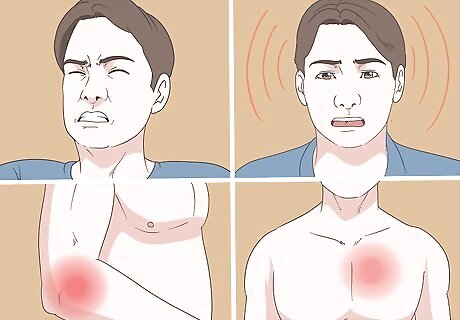
Seek immediate medical attention if you experience severe side effects. Although severe side effects of Wellbutrin are rare, it’s important to be on the lookout for them and go to the emergency department of a hospital or call emergency services if you notice any. Some symptoms to seek immediate help for include: Seizures (if you are prone to or have a history of seizures) Confusion Hallucinations Irrational fear Muscle or joint pain A rapid, irregular, or pounding heartbeatWarning: Wellbutrin won't cause seizures, but it lowers the threshold for having a seizure if you have a seizure disorder. Tell your doctor if you have a history of seizures or a strong family history of seizures before you take Wellbutrin.

Stop taking Wellbutrin and seek medical help for an allergic reaction. Allergic reactions to Wellbutrin are rare, but some people have experienced them. If you do notice signs of an allergic reaction, stop taking your medication immediately and call emergency services or go to the emergency department of the nearest hospital. Some signs that you might be having an allergic reaction to Wellbutrin include: Fever Blisters, hives, or a rash Itchy skin Swelling in your face, eyes, lips, tongue, throat, hands, lower legs, ankles, or feet Hoarse voice Difficulty breathing or swallowing Chest pain




















Comments
0 comment